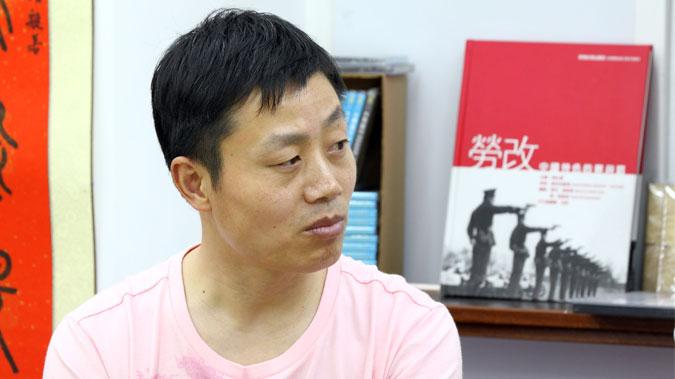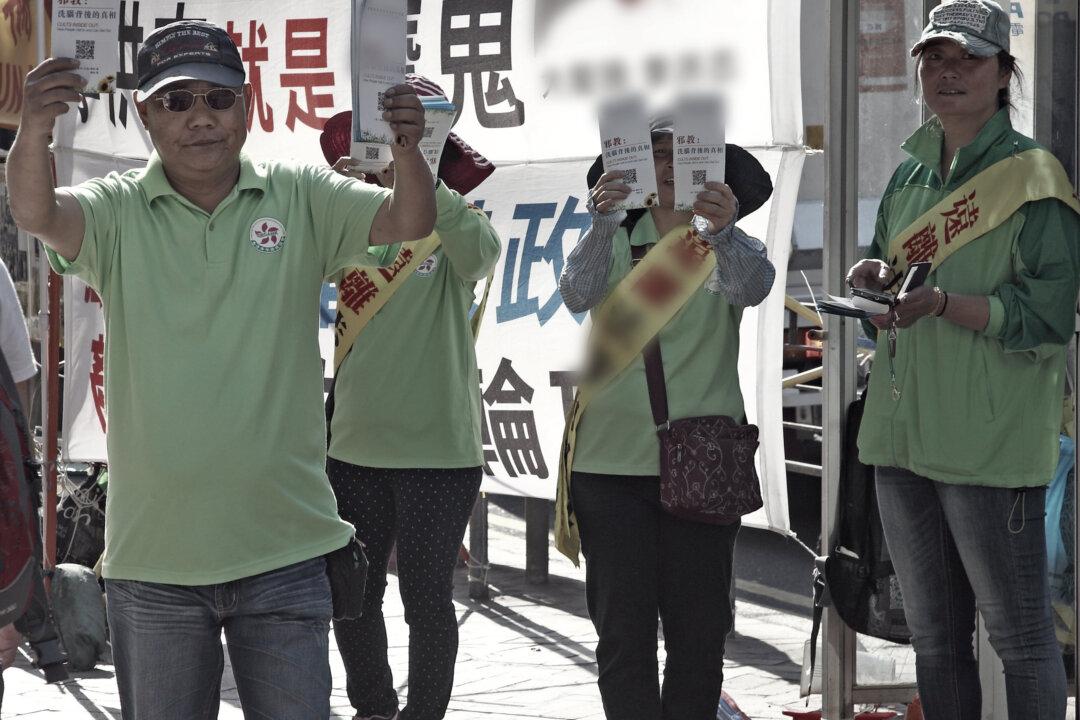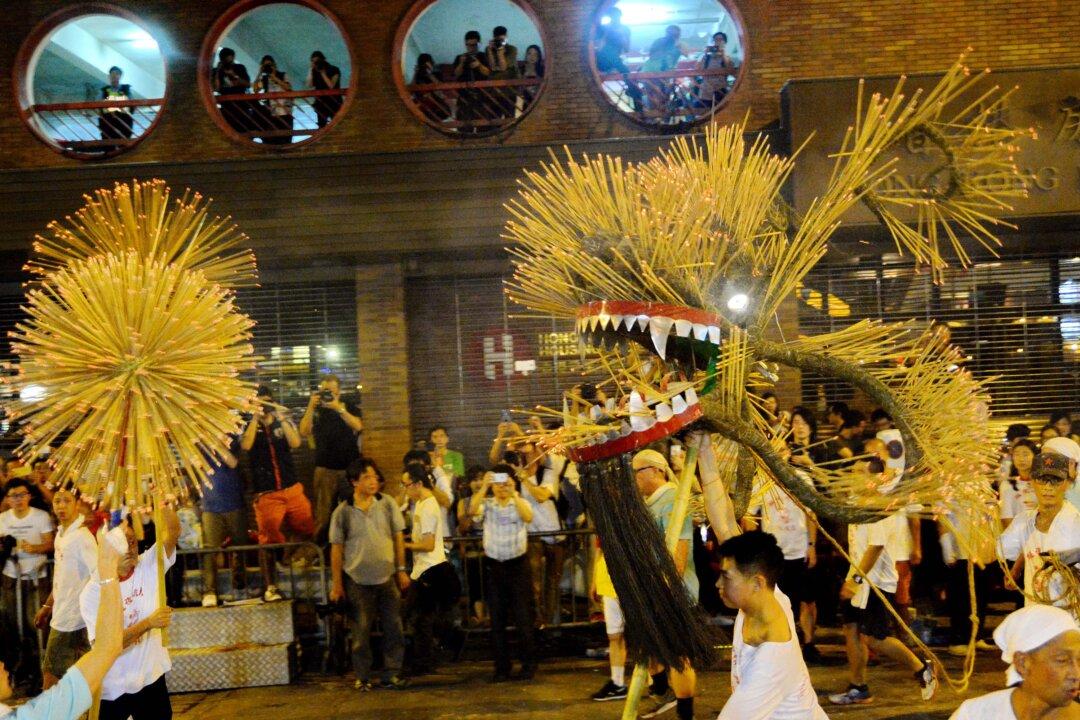Just before Christmas in 2012 a letter that had been smuggled into a Halloween Kit sold by K-Mart made international news.
The letter, in broken English with phrases in Chinese characters mixed in, told of the mistreatment of prisoners at the Masanjia Labor Camp in China and asked for help. Julie Keith of Portland, Ore., happened upon the letter and posted it on her Facebook page. That soon triggered a conversation in media and among human rights organizations about the forced labor camp system in China.
Experts agreed the letter was most likely genuine—certainly Masanjia was notorious for the tortures employed there, but who wrote that moving plea was a mystery.
Now, the Chinese author Du Bin tells the story of the letter writer in his latest book, “Roar of Masanjia.”
Three days after Keith in Oregon had found the letter, the letter writer contacted Du. To Du’s surprise, the person was his friend.
In 2008, the letter writer had been imprisoned in Masanjia and had been held there for 29 months, including 10 months during which he was severely tortured.
After 23 months of preparation, during which Du himself was illegally detained for 37 days and under house arrest for a year, the book “Roar” was published in December in Hong Kong in Chinese.
“Roar” is Du’s 11th book, and the third time he has treated Masanjia Labor Camp. In July 2014 he published “Vagina Coma” in Hong Kong about the sexual torture of women held in Masanjia, and in April 2013 he released in Hong Kong and Taiwan a documentary film, “Above the Ghosts’ Heads,” which was also about the abuse of women in Masanjia.
In the book “Roar,” Du quotes the person who wrote the letter as saying about Masanjia, “Any government on this planet shouldn’t tolerate the continued existence of such evil in this world. If it is something that doesn’t concern you, it would mean that you are part of the evil Chinese Communist Party.”
Because the subject of the book is a Falun Gong practitioner living in Beijing, Du chose to refer to him as “he” throughout his book. All Falun Gong (also known as Falun Dafa) practitioners in China are liable to arbitrary arrest, and this particular practitioner, if identified, would surely be subjected to vicious reprisals for his writing of the letter.

After the publication of “Roar,” Epoch Times had the opportunity to interview Du. As in Du’s book, the letter writer is in this interview referred to throughout as “he” or “him.”
Epoch Times: Why did you write the book “The Roar of Masanjia”?
Du: The story needed to be written down. What I have always been trying to say is that humans are not animals, and from this, it is important to show how a person is able to survive in a difficult situation, which is the theme of this book.
I told him that I have written many books exposing the wrongdoings of the government. Perhaps he trusted me because of what I’ve done, and so he told me his story. The entire process was quite a surprise.
Epoch Times: Could you talk about how he reached you?
Du: Before he reached me, I was actually looking for the person who wrote the letter. I was very curious, how did the letter end up in the United States?
In fact, the person who wrote the letter is my friend. Three days after the newspaper The Oregonian published the report, he came looking for me, asking me if I had seen that news report.
He asked me, “Do you know who wrote the letter?” I asked “Of course I want to know. I have been trying to find this person.” He told me “I am the one.”
I was shocked, very shocked. Even though I had known him for a year or two, I had only sat down and talked with him a few times. I knew he had stayed in the labor camp, but we had never discussed it in detail before.
First, I was very shocked. Second, I was surprised. We are all reporters. It was like a gift from God. It was something very important.
I asked him, “Can you prove that you wrote it?” And he asked me to get him some pen and paper. “Does it look like my handwriting?” It really was his handwriting. And there are some people I have known from Masanjia, and all of them know him. It was he who wrote the letter.
In April 2013, Lens Magazine in China reported on Masanjia Women’s Labor Camp, and millions of people have read it. This is something that should have been shocking, but only a few people are aware that it is against a special group of people, and these people are Falun Gong practitioners.
Epoch Times: Why a “special group of people?”
Du: In China, it is not possible to publish a magazine that mentions Falun Gong practitioners are the target of these tortures. The publishing company is going to have some problems, reporters will leave, and the license of the company is going to be revoked.
So, Chinese magazines stop having stories about current political affairs, instead having topics that are less sensitive. I told the author of that report, telling him that he has already completed his mission. Now, it is my turn. I will continue the path he has taken.
Epoch Times: Could you tell that he was someone who had been persecuted?
Du: He told me that, at the Masanjia Male Labor Camp, they put a dentist’s mouth gag on him and didn’t take it off. He had nerve damage as a result. The longest time for him to wear the mouth gag was one day. I was shocked. I asked him “What did you feel when it was removed?” He told me that he couldn’t close his mouth afterward—he couldn’t feel anything, his mouth was numb.
All the tortures listed in the book have been used against him, such as extreme body stretching, stretching and handcuffing, the death bed, forced feeding, and psychological torture, which is the worst.
He told me a term called “removal of nerve”—removing all your senses. Afterward, you would be like a robot, like a person made up of rubber, without feeling, and you would do whatever is asked of you without thinking.
Once his wife sent him a letter asking for a divorce because she couldn’t stand the pressure of police looking for her, police looking for her family, ever since he started practicing Falun Gong. And his wife was greatly in pain during the time he was locked up in a brainwashing center. He said, in fact, it was very painful when he first received the letter from her.
He told me that inside the labor camp, a plastic spoon and the letter were the only personal items he had. He said he had put transparent tape on the back of the letter and took it out to read whenever he had time at night.
Once, the police found the letter when trying to torture him, and the police refused to give it back. Later, he asked the police for the letter, but the policeman said he couldn’t find it anymore. The police told him that they would confiscate anything that would encourage resistance [to their attempts to brainwash him], anything with the power to oppose their persecution of him.
What’s more, and something quite unique is that, he told me time did not exist in Masanjia—people weren’t allowed to have a watch. For example, police would ask prisoners who worked for them to bring people to work. There was no way to know exactly what time it was. If the police didn’t give you permission to get off work, you just continued to work.
Epoch Times: How was he able to write such a letter in that difficult situation?
Du: I asked. I asked him how many letters did he write. He told me that there were two other practitioners besides him who wrote the letters. He wrote a copy of the letters and gave it to another practitioner secretly. This practitioner then made several copies from the original one.
The cell was lit 24 hours a day. He told me how he wrote the letters. He slept at the upper bunk of the bed, facing the wall. He secretly put a piece of paper on his pillow and started writing. He had to listen intently, for there was “Zuo Ban,” someone sitting in the cell who acted as a representative of the police.
Between 1 and 3 in the morning, when Zuo Ban began to be very sleepy, he told me he wrote about a dozen letters. Two other practitioners wrote a few letters. There were a total of twenty-plus letters.
He told me that he could understand English. He knew that some of the products they made, such as smiling pumpkins, were surely used for Halloween by Western countries. He was thinking that, if the letters were to come out in public, it would put some pressure on the CCP, for that was the year when China hosted the Olympics. The conditions at the labor camp would surely improve as well. So, he secretly placed the letters into the boxes of Halloween products.
A few days after the opening of the Olympics, a letter hidden inside the boards of a practitioner’s bed was found when police were doing regular checking [of the cells.] The police captain was outraged and started torturing the practitioner viciously. The practitioner said he was the one who wrote the letter. The authorities were afraid to make a huge thing out of the incident. So, the practitioner got lucky and [got away with it].
Epoch Times: What was he thinking at the time?
Du: He was thinking of using the letters to tell others what was happening inside the labor camp, how these Halloween products were made, and how Falun Dafa practitioners were treated.
It took a total of 23 months from the time he accepted my interview to the publication of the book. During this period, I kept on thinking, how should I write the story? I decided I would write the story before he was imprisoned in Masanjia and also the story after he got out of Masanjia. The story of what happened during Masanjia would be based on his oral account. But the whole process wasn’t easy.
What I want to tell the readers is the story of how a person survives in an extremely difficult situation. He told me, he used to be a person afraid of death. He said he was able to live on because of his practice of Falun Gong.
I asked him, “Are there any inspirational words from your practice that motivated you to live on?” He replied, “If you can let go of life and death, you’re a God; if you can’t let go of life and death, you’re a human.”
He told me that this phrase had greatly inspired him. He said it was no big deal to let go of life and death. For this reason, he was persecuted 10 months during the 29 months he was imprisoned in the labor camp. He told me he was one who suffered the most severe persecution at Masanjia. There are many details in the book about the evil within the Chinese labor camp. I believe the readers will be very stunned when they read it.
Epoch Times: What was his most unforgettable experience at the labor camp?
Du: He told me it was force feeding, or special force feeding. How was it done? Because the people in the labor camp couldn’t bring him to submission with their own force feeding, so two female nurses, experts from the Masanjia Hospital, were called to the labor camp. Police were asked to see how the nurses carry out force feeding.
The two nurses carried a bowl of cornmeal porridge and opened his mouth with a mouth gag. Then the porridge was poured down the mouth with a spoon. As for special force feeding? You will gasp for air when your nose is pinched. Once you gasp for air, you will swallow the food.
He said that he simply did not gasp for air, maybe because he had been force fed so many times. The nurses thought he was dead. He told me that he couldn’t stand it eventually and began retching—the porridge was spilled on to the clothes of the doctors, nurses, and the police. He told me that the mouth gag was removed for fear that he might die. However, the mouth gag was put back on after he refused to eat by himself. After two to three hours, they eventually stopped because of the continued retching.
He shared with me that he once was on a hunger strike, an example that was not included in the book. He asked me “Do you know how painful it is to be on a hunger strike?” He said that after the hunger strike reached a certain level, he felt like he could eat anything—bricks and toothpaste.
Epoch Times: Why do you keep on reporting about Falun Gong?
Du: I know topics like the Tiananmen Square massacre and Falun Gong are very sensitive in China, something that not even the foreign media dares to write about. As for myself living in China, why am I not afraid to report this? There are two reasons. First, I believe that as a human being, I would like to know how a person survives in a difficult situation, and what he thinks during that time. Second, we are neither animals or beasts, so I do not tolerate any inhuman treatment of any other human being.
For example, once I was at the detention center and I was being interrogated about Falun Gong and how women were treated at Masanjia Women’s Labor Camp. I was not afraid at all. Whenever I think back about this, I am still outraged. I remember I told them “We are human beings, and as human beings, they should not be treated like animals. So, I write about this.” Then I told myself, “If you want to throw me into prison, just do it, stop wasting your time talking to me.” Finally, they stopped talking.
I believe the Masanjia Women’s Labor Camp is a place used to torture Falun Gong practitioners. And for these people, this place is basically like hell. There is information circulating online that it is under the control of the Political and Legal Affairs Committee to transform Falun Gong practitioners. What has happened here, the persecution, is the result of power and permission granted by the Chinese regime. I have written a book about this. I am not talking nonsense. Nobody is holding these police officials accountable—they were asked to do what they did by the Chinese regime.
There was gulag in the Soviet Union. In China, there is Masanjia.
Epoch Times: Is the persecution still happening?
Du: The labor camp where the person who had resisted persecution by writing letters has been turned into a prison camp. Masanjia Women’s Labor Camp has been turned into a drug rehabilitation center. I am certain about these.
Based on these, how can there not be any persecution? It is still happening. But the persecution has become less overt. The Chinese authority was stunned when local Chinese media reported about Masanjia. Based on what I have learned, Masanjia is a very typical place where Falun Gong practitioners are persecuted.
Epoch Times: Can you talk about your impression of Falun Gong practitioners?
Du: I have come in contact with those who have been severely persecuted. When they talked about their stories, they remained very peaceful and calm, as if they were telling other people’s stories. I am very, very impressed about this. To be tortured and humiliated in such a horrible environment and then to share their stories so peacefully, I am very impressed.
Epoch Times: Falun Gong practitioners follow the principles of truthfulness, compassion, and tolerance. Do you see these principles when interacting with them?
Du: Yes, I have seen it, without a doubt. I have come in contact with about 20 Falun Gong practitioners. They gave me the impression of being honest, kind, patient, and tolerant. From their experiences, their stories, and the person who wrote the letter, I can sense truthfulness, compassion, and tolerance. From the details of their stories, I could really feel it.
If anyone does not believe in truthfulness, compassion, and tolerance, he should start practicing Falun Gong. Then, he would know.
Epoch Times: Can you talk about your own experience of being detained?
Du: On July 8, 2013, when I was released on bail from the detention center at Fengtai Distract, Beijing, I felt that I had learned a lot. First, I had seen with my own eyes what it was like being inside [one of the places where people were held.] Second, after getting out, I had a sense of security with my every step, a feeling that I didn’t have before. I knew what I was doing.
After 33 days, I was at the procuratorate, and a captain from one of the domestic security teams in Fengtai came to see with another domestic security guard. The captain asked me “Du, do you know why you are here?” I replied “Why?” The captain then said, “Someone from the higher authorities wants to know why a person with so many good years ahead of him has become a person who specifically exposes the wrongdoing of the Chinese regime.”
I laughed when I heard this—the wrongdoing was not a scar for the Chinese regime; rather it was a scar for the Chinese people. The captain also said he couldn’t tell me what was the level of the high-ranking official.
Why did I include the story of me being detained on the back cover of the book? I have a simple goal. After I was released on bail, I didn’t receive any legal papers. So I thought to myself, I would write everything down because I could write. I would use words to express my thoughts, my anger.
Chinese people have suffered so much. A reporter from the New York Times once told my friend “Look at the books Du has written. There are so many horrible stories. And still, Du has a smile on his face everyday. He must have a good attitude to live his life.” I was a bit sad when I heard this.
It is impossible not to feel the suffering of all those petitioners, the suffering of all Falun Gong practitioners, and the suffering of all Chinese people since the foundation of the Chinese Communist Party in 1921.
I believe I have been seriously injured as well. Though I am not afflicted with these sufferings, I can feel their pain. If I don’t write, what else can I do? Sometimes I do want to give up, stop doing such a painful job. But such a thought does not linger.
One should do what he is supposed to do. I also think this might have something to do with my temperament—I am born for the purpose of suffering, as I must speak up against injustice.
Please read the original Chinese article.





